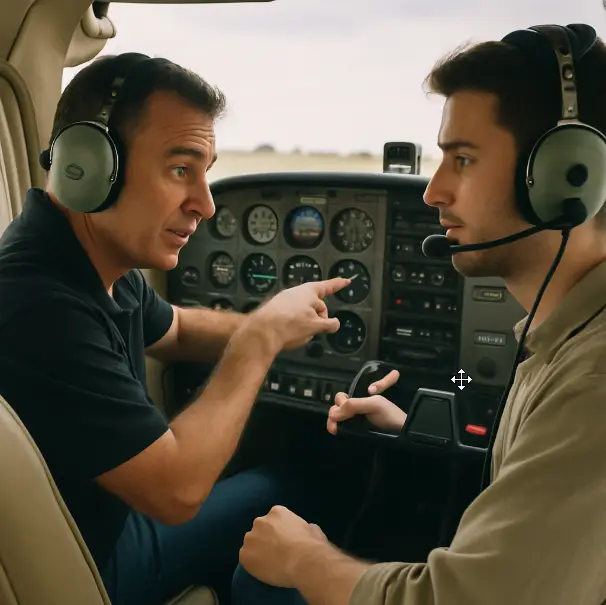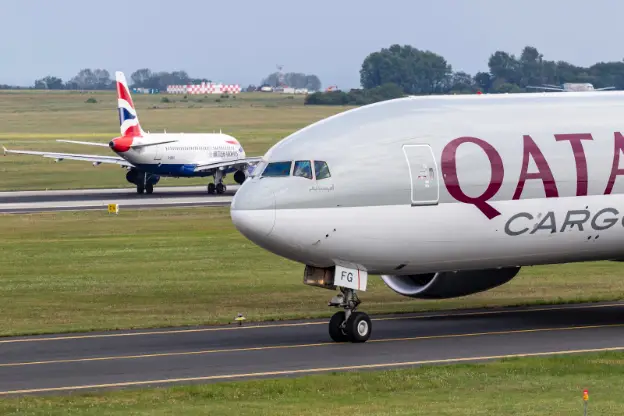Explore Exciting Commercial Pilot Career Opportunities

- aviatorpro_6714
 Becoming a commercial pilot is a dream for many aviation enthusiasts. While the allure of flying large airliners is strong, there’s a whole world of opportunities for pilots beyond the traditional airline route. In this article, we explore various career paths for commercial pilots, from charter services to cargo transport and more. These alternative paths not only provide diverse flying experiences but also offer unique challenges and rewards. Delving into these opportunities can open doors to fulfilling careers that match both personal interests and professional aspirations.
Becoming a commercial pilot is a dream for many aviation enthusiasts. While the allure of flying large airliners is strong, there’s a whole world of opportunities for pilots beyond the traditional airline route. In this article, we explore various career paths for commercial pilots, from charter services to cargo transport and more. These alternative paths not only provide diverse flying experiences but also offer unique challenges and rewards. Delving into these opportunities can open doors to fulfilling careers that match both personal interests and professional aspirations.
The aviation industry is vast and dynamic, presenting pilots with a range of environments, from bustling international airports to remote regional airstrips. Exploring alternative career paths can lead to more personalized and flexible work schedules, diverse flying experiences, and the chance to work closely with a variety of clients and industries. Each path has its unique set of demands and benefits, allowing pilots to tailor their careers to their individual lifestyles and preferences.
Before we delve into alternative careers, it’s important to understand the traditional path most aspiring pilots envision: flying for major airlines. This is often considered the pinnacle of a pilot’s career, with opportunities to fly large aircraft across the globe. However, airline pilot jobs are highly competitive, and the lifestyle can be demanding, with long hours and frequent travel. Major airlines offer structured career progression, often accompanied by attractive salary packages and benefits, making it a sought-after goal for many pilots.
Despite the challenges, flying for an airline provides pilots with the opportunity to be part of a global network, engaging with a diverse range of people and cultures. The prestige associated with flying for a major airline is considerable, and for many, the chance to command a state-of-the-art aircraft is the ultimate career achievement. However, the path to becoming an airline pilot requires dedication, resilience, and a willingness to embrace the industry’s fast-paced and sometimes unpredictable nature.
To become an airline pilot, you must complete rigorous pilot training programs. These programs include ground school, flight training, and simulator sessions. Many pilots start their journey by obtaining a Private Pilot License (PPL), followed by a Commercial Pilot License (CPL) and an Airline Transport Pilot License (ATPL). These certifications require significant time, effort, and financial investment. The training is designed to build a solid foundation in aviation theory, practical flying skills, and safety protocols.
Pilot training programs are often seen as a rite of passage for aspiring pilots, demanding a high level of discipline and commitment. The process involves mastering a wide range of skills, from navigation and meteorology to aircraft systems and emergency procedures. Additionally, flight training requires aspiring pilots to accumulate a substantial number of flight hours, often under varying conditions, to ensure they are well-prepared for any situation they may encounter. The journey through these programs is challenging but ultimately rewarding, providing the essential skills and knowledge needed to navigate the skies safely.
For those who seek different flying experiences or wish to avoid the competitive airline environment, there are numerous other career paths available. These paths often offer more flexibility and can align better with individual lifestyle preferences, providing pilots with a variety of flying experiences beyond the structured airline environment.
Exploring alternative career paths allows pilots to leverage their skills in diverse ways, from providing personalized services in charter flights to playing a vital role in global logistics as cargo pilots. These careers can lead to unique professional experiences, allowing pilots to work in specialized areas of aviation that are less mainstream but equally rewarding. By choosing an alternative path, pilots can find niches that suit their interests and strengths, making their career journey both enjoyable and fulfilling.
Charter services offer personalized flights for individuals, businesses, and groups. As a charter pilot, you’ll fly a variety of aircraft, from small planes to jets, catering to clients’ specific needs. This career path offers flexibility and variety, as you may fly to unique destinations not typically serviced by commercial airlines. Charter pilots often enjoy a more personalized interaction with their passengers, enhancing the travel experience for both parties.
Working in charter services requires adaptability and excellent customer service skills, as pilots often deal directly with clients. This role can be particularly appealing for those who enjoy the challenge of tailoring flights to meet specific requests, such as flying to remote locations or accommodating last-minute schedule changes. Additionally, charter pilots can experience a wide range of flight operations, making every day different and offering a dynamic and rewarding career.
Cargo pilots transport goods rather than passengers, playing a crucial role in global logistics. This career can involve flying large cargo planes or smaller aircraft for regional deliveries. Cargo transport offers steady work and often provides a more predictable schedule compared to passenger airlines. The role of a cargo pilot is essential in ensuring the timely delivery of goods across various industries, from consumer products to critical medical supplies.
Cargo pilots often benefit from more consistent flight schedules, with many operations taking place at night when airspace is less congested. This can lead to a more balanced work-life schedule compared to passenger airline pilots. The cargo sector also offers opportunities for career growth, with pilots advancing to operate larger aircraft or moving into management roles within logistics companies. This path is ideal for those who prefer the operational side of aviation and the satisfaction of contributing to a critical component of the global economy.
Corporate pilots fly private jets for businesses and high-net-worth individuals. This role combines the professionalism of airline flying with the personalized service of charter flights. Corporate aviation offers the chance to fly sophisticated aircraft and visit exclusive destinations. Pilots in this field often enjoy more control over their schedules and the opportunity to develop long-term relationships with their clients.
Corporate aviation can be highly rewarding, offering pilots the chance to work with state-of-the-art equipment and operate in an elite sector of the aviation industry. The role demands a high level of professionalism and discretion, as pilots often work closely with influential clients. Pilots in this field may also enjoy perks such as luxurious travel
accommodations and the opportunity to visit some of the world’s most exclusive locations. This path is ideal for those who appreciate the blend of technical expertise and personalized service.
Becoming a flight instructor is a rewarding way to share your passion for aviation. Instructors teach aspiring pilots the skills needed to obtain their licenses. This career path is ideal for those who enjoy teaching and mentoring others, and it provides the opportunity to build flight hours and experience. Flight instructors play a crucial role in shaping the next generation of pilots, instilling the fundamentals of aviation and a love for flying.
Flight instruction allows pilots to refine their own skills as they teach others, reinforcing their knowledge and expertise. This role is particularly suited for those who derive satisfaction from seeing their students progress and succeed. Additionally, instructors often build strong professional networks within the aviation community, opening up further career opportunities. For many pilots, teaching is not just a job but a fulfilling vocation that contributes to the growth and safety of the aviation industry.
Aerial Survey and Photography
Aerial survey pilots collect data from the skies, supporting industries like agriculture, forestry, and environmental science. Similarly, aerial photography pilots capture stunning images from above for media, film, and real estate. Both roles offer unique flying experiences and the chance to contribute to various fields. These positions require precision flying and an eye for detail, making them suitable for pilots with a keen interest in technical and creative aspects of aviation.
Working in aerial survey and photography allows pilots to engage in specialized flying tasks, often operating in unique airspaces and using advanced technology. This career path offers the opportunity to work on diverse projects, from mapping landscapes to capturing cinematic footage for films. Pilots in this field enjoy the blend of technical skill and artistic creativity, making each flight an exciting and productive experience. The work can be both challenging and rewarding, offering pilots the chance to contribute to important research and creative endeavors.
Emergency Medical Services (EMS)
EMS pilots transport medical personnel, patients, and organs for transplant in critical situations. This high-stakes career requires quick thinking and precision flying, often in challenging conditions. EMS pilots make a tangible difference in people’s lives, providing a sense of purpose and fulfillment. The role demands not only exceptional flying skills but also the ability to remain calm and composed under pressure.
EMS pilots often work closely with medical teams, contributing to life-saving missions and emergency responses. The nature of the work can be unpredictable, requiring pilots to be ready at a moment’s notice. Despite the challenges, the impact of their work is profound, offering a deeply rewarding career for those committed to making a difference. This path is suited for pilots who thrive in high-pressure environments and are driven by a strong sense of duty and compassion.
Agricultural Aviation
Also known as crop dusting, agricultural aviation involves applying fertilizers, pesticides, and herbicides to crops. Pilots in this field must navigate low altitudes and challenging terrain. Agricultural aviation is a specialized niche that offers seasonal work and requires skillful flying. The role is crucial in supporting the agricultural industry, ensuring the health and productivity of crops.
Agricultural pilots often work in rural areas, operating small and agile aircraft designed for precision application. The work is physically demanding and requires a deep understanding of agricultural processes and safety regulations. Despite the challenges, pilots in this field enjoy the satisfaction of contributing directly to food production and supporting local communities. Agricultural aviation offers a unique blend of technical flying skills and practical agricultural knowledge, making it a fulfilling career for those with a passion for both aviation and farming.
Considerations for Choosing a Career Path
When deciding on a career path, consider factors such as lifestyle, work-life balance, salary, and personal interests. Each path offers different benefits and challenges, so it’s essential to find the one that aligns with your goals and values. A thorough understanding of what each path entails can help you make an informed decision that leads to a satisfying and successful career.
Self-assessment is a crucial step in choosing the right career path. Consider your strengths, weaknesses, and what aspects of flying you find most appealing. Whether it’s the thrill of flying different aircraft, the challenge of operating in unique environments, or the satisfaction of providing critical services, identifying your motivations will guide you toward the most suitable path. Additionally, seeking advice from industry professionals and mentors can provide valuable insights and help you navigate your career choices effectively.
Job Market and Demand
Research the demand for pilots in your chosen field. Some areas, like cargo transport and EMS, may offer more job stability than others. Stay informed about industry trends and developments to make informed decisions about your career. Understanding the job market dynamics can help you identify areas of growth and potential opportunities for advancement.
Networking within the aviation community can provide valuable insights into job market trends and emerging opportunities. Attending industry conferences, joining professional associations, and engaging with online forums can help you stay connected and informed. By staying proactive and adaptable, you can position yourself advantageously in the ever-evolving aviation industry, ensuring a successful and rewarding career.
Licensing and Certifications
Ensure you have the necessary licenses and certifications for your chosen career path. Some roles may require additional training or endorsements beyond the standard commercial pilot license. Continuous learning and skill development are crucial in the aviation industry. Staying current with advancements in technology and regulations will enhance your employability and career progression.
Investing in specialized training programs or obtaining additional certifications can open doors to new opportunities and increase your competitiveness in the job market. Whether it’s instrument ratings, type-specific endorsements, or advanced safety courses, enhancing your qualifications will allow you to pursue a broader range of career paths. Embracing a mindset of lifelong learning will not only enhance your skills but also enrich your career and personal growth.
Conclusion
The world of aviation offers a wealth of career opportunities beyond traditional airline pilot jobs. Whether you choose charter services, cargo transport, or another path, each option provides unique experiences and rewards. By exploring these alternative careers, commercial pilots can find fulfilling and exciting ways to pursue their passion for flying. Remember to consider your personal goals, lifestyle preferences, and the job market when making your decision.
With the right mindset and preparation, you can navigate the skies and achieve your dream career as a commercial pilot. The diversity of career paths in aviation ensures that there is something for everyone, regardless of interests or goals. By staying informed, adaptable, and committed to your passion, you can carve out a rewarding career that allows you to soar to new heights, both professionally and personally.



